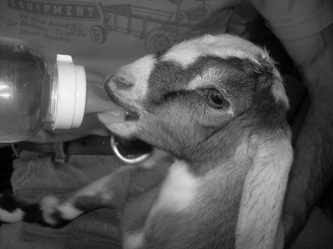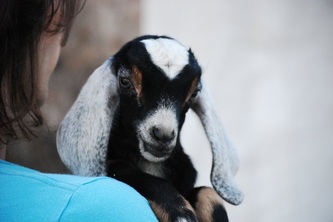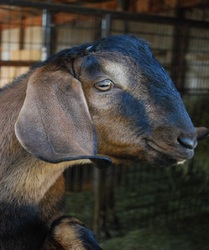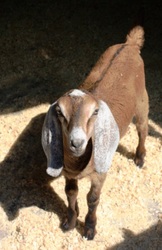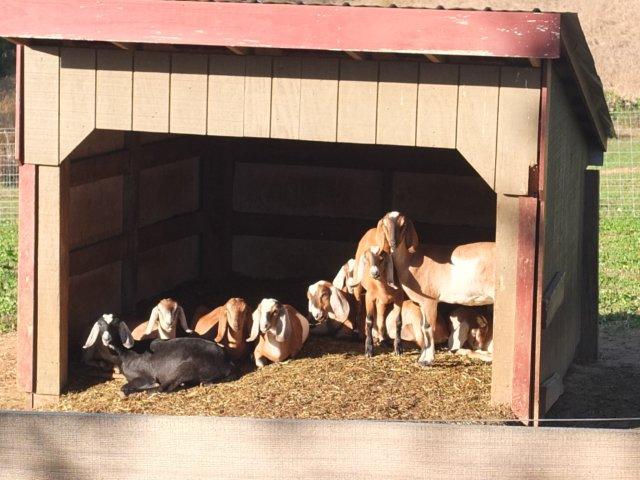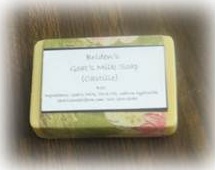Why Nubian Goats?
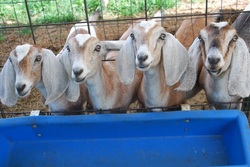
Nubian goats are an ideal livestock choice for many producers. Their small size means reduced feed costs, less expensive handling facilities, and ease of handling. They are prolific producers with a short gestation and short interval from birth-to-puberty. They often have multiple offspring, quickly building your herd. They are personable and curious by nature, bringing their owners hours of enjoyment.
Tall and graceful, these goats are a delightful animal to own. They are loaded with personality and charm, and are easy to milk. Nubians can display an array of colors, and their long pendulous ears and Roman noses make them distinct. Each Nubian's personality is very unique. Besides being very talkative, they are smart, and can keep things pretty interesting on the farm.
Due to their Middle-Eastern heritage, Nubians can live in hot climates and have a longer breeding season than other dairy goats. Considered a dairy or dual-purpose breed, Nubians are known for high butterfat content of their milk. (at our farm, we also make availble our goat's milk for animal consumption) And, like most dairy goats, they are normally kept hornless by disbudding within approximately two weeks of birth. Nubians can be solid-colored or partly-colored, with the most common colors being black, red, and tan in some combination. Usually, there is shorter hair on Nubian males, particularly along the back and on the thigh, than is commonly found on Swiss breeds. The utter of the Nubian is capacious but is somewhat more pendulous than that of Swiss breeds. A mature doe should stand at least 30 inches at the withers and weigh 135 pounds or more, while the males should stand at least 35 inches at the withers and weigh at least 175 pounds. The Nubian usually gives less milk than other breeds, but produces a milk of a higher butterfat content.
NOTE: All goats have been tested as free of CAE disease
Tall and graceful, these goats are a delightful animal to own. They are loaded with personality and charm, and are easy to milk. Nubians can display an array of colors, and their long pendulous ears and Roman noses make them distinct. Each Nubian's personality is very unique. Besides being very talkative, they are smart, and can keep things pretty interesting on the farm.
Due to their Middle-Eastern heritage, Nubians can live in hot climates and have a longer breeding season than other dairy goats. Considered a dairy or dual-purpose breed, Nubians are known for high butterfat content of their milk. (at our farm, we also make availble our goat's milk for animal consumption) And, like most dairy goats, they are normally kept hornless by disbudding within approximately two weeks of birth. Nubians can be solid-colored or partly-colored, with the most common colors being black, red, and tan in some combination. Usually, there is shorter hair on Nubian males, particularly along the back and on the thigh, than is commonly found on Swiss breeds. The utter of the Nubian is capacious but is somewhat more pendulous than that of Swiss breeds. A mature doe should stand at least 30 inches at the withers and weigh 135 pounds or more, while the males should stand at least 35 inches at the withers and weigh at least 175 pounds. The Nubian usually gives less milk than other breeds, but produces a milk of a higher butterfat content.
NOTE: All goats have been tested as free of CAE disease
At this time, no goats (or sheep) are available for sale
~ Goat Milk Soap ~
A Brief History of Soap in the Past Century Until the early 1900's, soap making was typically a household chore and involved the use of fats, lye, oil and/or water. Though the natural cleaning ability of this natural soap was quite good, it was equally harsh on a person's skin. Given the fat and oil shortage resulting from World War I, synthetic detergents were developed. After World War II, mass production of household and laundry detergents increased. By the mid century, detergents outsold soap for all household cleaning (many "soaps" were made of detergent to some degree). Commercial soap-makers could strip out natural products (like the highly moisturizing glycerin), replace them with chemical additive, and sell them cheaper. Today, though most commercial soaps smell good and clean well, natural ingredients have been replaced by chemical additives. All-natural soaps retain the natural cleansers and moistuizers as well as scents and colors.
NOTE: As the detergent soap popularity increased, so did the need for specialty skin moisturizers to soften the dryness caused by soap.
NOTE: As the detergent soap popularity increased, so did the need for specialty skin moisturizers to soften the dryness caused by soap.
Natural Soap Containing Goat's Milk Goat's milk is easily absorbed by the skin and is excellent for sensitve skin. People with eczema or psoriasis benefit from goat's milk. It contains many vitamins and natural trace elements that make it not just good for our skin, but our entire body. Also, goat's milk soap has a PH level - a meausure of it's acidity - is similar to our skin, which helps protect the skin from invading bacteria and chemicals we come in contact with everyday. And as an exfoliant, the goat's milk contains alpha-hydroxy acids which slough off dead skin and reduces surface tension.
Briden's Goat's Milk Soap at East Rivendell Farm

In the spring of 2000 we purchased our first purebred Nubian Dairy Goat from our now good friends Bob & Mary Clarke of Cherry Hill Nubians. Her name was Briden. Briden gave us our first experience with this wonderful breed. Since then we have added quite a few to our herd over the years and in that process we have learned a lot about how to use the milk in different ways. Although we cannot sell our milk we can use it to make soap that we sell here at the farm. Besides the milk, the soap is made from pure olive, palm, coconut and castor oils. Fragrant oils and essential oils are added. We do offer unscented and medicinal herbs are sometimes added for different skins problems.
In January of 2011 we lost our dear Briden, but it always brings a smile to my face when I see her name on our label knowing the legacy lives on. I know you will enjoy Bridens Goats Milk Soap as much as we and many others do.
In January of 2011 we lost our dear Briden, but it always brings a smile to my face when I see her name on our label knowing the legacy lives on. I know you will enjoy Bridens Goats Milk Soap as much as we and many others do.
Year Round Available Scents :
Lavendar - somewhat minty-herbal-fresh-clean-smokey-purple smell; it's many benefits include it's anti-depressent and calming effect; analgesic properties for respiratory relief; defends system against airborne viruses; good for aches and pains and muscle stiffness.
Tea Tree - a perppermint or euchlyptis smell;the tea tree oils's benefits: a general disinfectant that fights bacteria in all kinds of wounds and infections, including ACNE; treats fungal diseases affecting humans and animals; good skin penetrator which helps skin to heal by encouraging the formation of new scar tissue; very gentle on sensitive skin.
Jewel Weed - sweet floral smell; it's greatest benefit is that it is nature's antidote for poison ivy.
Mandarin Orange - lucious ripe orange fruit with creamy muskiness; benefits include that it can improve the looks of scars, stretch marks, and aging skin when it is blended with a carrier oil like grape seed oil; it is a mild oil that is safe for children, pregnant woman, and the elderly when used in baths or body washes.
Orange Ginger - orange citrus smell; benefits include: ginger reduces the pain caused by arthritis; minimizes digestive discomfort; ginger is an expetorant and reduces respriatory congestion.
Castille - natural freshness smell; benefits include gentle skin cleaning with a rich and fluffy lather; minimal environmental impact as it contains no synthetic detergents; can be used as a mult-purpose household cleaner.
Rosemary Mint - sharp, cool minty smell ; benefits include that it increases circulation; it helps with mental clarity and is known as the herb of rememberance.
Additional seasonal scents may be available. Please contact us to check...
Prices are $5 and $6, depending on the size.
Lavendar - somewhat minty-herbal-fresh-clean-smokey-purple smell; it's many benefits include it's anti-depressent and calming effect; analgesic properties for respiratory relief; defends system against airborne viruses; good for aches and pains and muscle stiffness.
Tea Tree - a perppermint or euchlyptis smell;the tea tree oils's benefits: a general disinfectant that fights bacteria in all kinds of wounds and infections, including ACNE; treats fungal diseases affecting humans and animals; good skin penetrator which helps skin to heal by encouraging the formation of new scar tissue; very gentle on sensitive skin.
Jewel Weed - sweet floral smell; it's greatest benefit is that it is nature's antidote for poison ivy.
Mandarin Orange - lucious ripe orange fruit with creamy muskiness; benefits include that it can improve the looks of scars, stretch marks, and aging skin when it is blended with a carrier oil like grape seed oil; it is a mild oil that is safe for children, pregnant woman, and the elderly when used in baths or body washes.
Orange Ginger - orange citrus smell; benefits include: ginger reduces the pain caused by arthritis; minimizes digestive discomfort; ginger is an expetorant and reduces respriatory congestion.
Castille - natural freshness smell; benefits include gentle skin cleaning with a rich and fluffy lather; minimal environmental impact as it contains no synthetic detergents; can be used as a mult-purpose household cleaner.
Rosemary Mint - sharp, cool minty smell ; benefits include that it increases circulation; it helps with mental clarity and is known as the herb of rememberance.
Additional seasonal scents may be available. Please contact us to check...
Prices are $5 and $6, depending on the size.
Slideshow of Our Soap Making (drag mouse to top left of screen to play)
All Farm Photos Taken by Hannah Fraley
